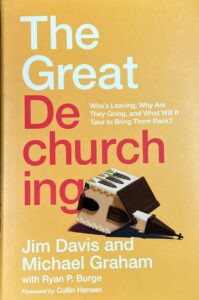The Great Dechurching by Jim Davis and Michael Graham
 In the last 25 years, 40M Americans have left the church. It’s the greatest religious movement in the history of the United States.
In the last 25 years, 40M Americans have left the church. It’s the greatest religious movement in the history of the United States.
In The Great Dechurching, Jim Davis and Michael Graham investigate this sociological shift, but more than that, with the help of Ryan Burge, they interview the dechurched to help us engage our friends who have left.
Just about everyone knows someone who has left the church. In fact, if you’re over 50 it’s likely that you have at least one adult child who is dechurched. Stories will include addiction, destructive behaviors, gender and sexual confusion, and suicide.
Davis & Graham demonstrate that dechurching is happening across denominations and demographics.
Some who leave are ‘casually dechurched,’ meaning they left unintentionally. They moved to a new city and never found a church home, or kid’s sports took them away on weekends, or COVID got them out of the habit.
Others who leave are ‘dechurched casualties,’ that is, there was some offense that led them to leave. They may have experienced trauma, abuse, hypocrisy, political syncretism, racism, or frustration and irrelevance.
Many who left still hold orthodox beliefs, comparable to their beliefs before they left. Sociologists talk about the sociology of religion in three parts: believing, belonging, and behaving. For many of the dechurched, though they have jettisoned belonging, their beliefs and behavior are largely intact.
Sorting through the data, Davis & Graham arrive at five categories of the dechurched:
- Cultural Christians
- Dechurched Mainstream Evangelicals
- Exvangelicals
- Dechurched BIPOC
- Dechurched Mainline Protestants and Catholics
Each categorical analysis begins with a story, to give you a picture of those who have left. It’s a way of personalizing the data. In each category, reasons for leaving and willingness to return are discussed.
A couple of highlights:
- 100% of Dechurched Mainstream Evangelicals are actively willing to return. They just need a nudge.
- Cultural Christians comprise 52% of the dechurched. In this group 50% are actively willing to return and 0% have ruled returning out. But they need some sort of relational connection and an invitation to return. Invite them to dinner!
- Exvangelicals are NOT willing to return. They were dechurched casualties who purposefully and permanently exited, often because of church hurt.
In the third section of the book, ‘Engaging the Dechurched,’ the reader is given reasons to hope, relational wisdom for how to engage our friends, parenting approaches that involve listening and engaging our kids, and what to say to the dechurched in conversation.
The book concludes with ‘Lessons for the Church,’ articulating a way forward that includes being confessional AND missional, being patient and loving when people leave, being empathetic when people have been hurt, engaging in discipleship, and shepherding the flock.
At the end of the book, I have a new compassion for, and interest in, my dechurched friends. I want to love my neighbor with curiosity and dignity, and who knows, I may even invite them to church!
